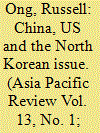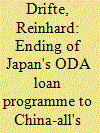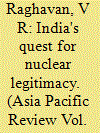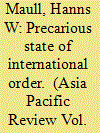| Srl | Item |
| 1 |
ID:
072679


|
|
|
|
|
| Publication |
2006.
|
| Summary/Abstract |
This article explores the strategic interests of China and the US in the North Korean issue. It examines their different perceptions of North Korea. For China, North Korea is needed as a friendly buffer state as well as a political ally. As the lone superpower and lynchpin of international security, the US wants to stop unpredictable North Korea from further developing its nuclear capabilities. The article then explores the shared goal of both great powers in promoting stability on the Korean peninsula and in preventing nuclear proliferation. It is argued that the interplay of Sino-US security interests has a huge impact on the evolution of the North Korean issue.
|
|
|
|
|
|
|
|
|
|
|
|
|
|
|
|
| 2 |
ID:
072678


|
|
|
|
|
| Publication |
2006.
|
| Summary/Abstract |
Official Development Assistance has been the most important instrument of Japan's foreign policy towards China since 1979 and has been useful in softening many difficulties in the bilateral relationship. Most of Japan's ODA to China consists of yen loans. Usually the Japanese government adheres to certain economic indicators set by the international banking institutions in order to phase out ODA programmes. However, in 2005 the Japanese government decided abruptly without applying the usual guidelines to end its loan aid to China by 2008, the year China will stage the Olympic Games. The article concludes that the decision was taken for political reasons, taking into consideration the criticism of certain Chinese policies, the deterioration of Japan's relations with China, the fast economic development of China with its implications for Japan's interests, and a general aid fatigue of public opinion against the backdrop of Japan's economic and budgetary problems. The process leading to this decision throws an additional light on all the complexities of the bilateral relationship, including the historical legacy.
|
|
|
|
|
|
|
|
|
|
|
|
|
|
|
|
| 3 |
ID:
072673


|
|
|
|
|
| Publication |
2006.
|
| Summary/Abstract |
This article examines the relationship between agriculture and food, agriculture and the environment and agriculture and trade, and discusses the various circumstances that affect the global supply of food. Japan's decline in international competitiveness and food self-sufficiency and the influence that may have on future food security is then discussed. The article concludes with recommendations for structural agricultural policy reform.
|
|
|
|
|
|
|
|
|
|
|
|
|
|
|
|
| 4 |
ID:
072676


|
|
|
|
|
| Publication |
2006.
|
| Summary/Abstract |
India first tested a nuclear device in 1974. It waited until May 1998, when it conducted a series of underground nuclear tests and declared itself a nuclear weapons state. The global response to both was widespread and hostile. Since then, successive Indian governments have worked hard to obtain a measure of nuclear legitimacy for the country's possession of nuclear weapons. Against heavy odds and opposition from many states, India is on the threshold of attaining a substantial measure of de facto legitimacy, even if a formal recognition of its status as a nuclear weapons state is unlikely to come about in the foreseeable future. This article examines the manner in which the search for nuclear legitimacy has been brought forward by India.
|
|
|
|
|
|
|
|
|
|
|
|
|
|
|
|
| 5 |
ID:
072675


|
|
|
|
|
| Publication |
2006.
|
| Summary/Abstract |
Energy security is, once again, a fashionable topic of conversation in Europe particularly in relation to natural gas, but most of the commentary is relatively general, failing to identify any specific problems. The Russian-Ukrainian gas crisis of January 2006 focussed attention on a specific natural gas security problem: the impact of a bilateral dispute on the transit of Russian gas via Ukraine. This episode reinforced old security lessons on the importance of diversity of routes and sources, but also showed that current events can be more influential than projections of supply adequacy at some date in the future. This event has highlighted the potential role of the European Union in natural gas diplomacy, and the Energy Charter Treaty in the legal framework for gas transit. But the most important legacy of the episode may be not in Russia-EU, but in Russia-CIS, energy relations.
|
|
|
|
|
|
|
|
|
|
|
|
|
|
|
|
| 6 |
ID:
072677


|
|
|
|
|
| Publication |
2006.
|
| Summary/Abstract |
The international order is becoming increasingly precarious as a result of the pressures of globalisation and inadequate policy responses by many states, most importantly the United States, which still holds a pivotal role in building and sustaining international order. The present state of affairs in global governance is characterised by 1) an overwhelming concentration of power at the level of interstate relations but 2) a diffusion of power if we look at the totality of international relations, 3) the erosion of state authority and political legitimacy, 4) the growing importance of markets and of 5) fundamentalist ideologies, 6) the declining utility and the paradoxical impact of force on political order, and 7) by the still indispensable but increasingly fragile base of international order in functioning statehood at the national level. Overall, this situation reflects a mismatch between political demands on and the actual supply of international order whose present state leaves much to be desired. By way of conclusion, the article offers some policy recommendations about how to change the present precarious situation.
|
|
|
|
|
|
|
|
|
|
|
|
|
|
|
|
| 7 |
ID:
072674


|
|
|
|
|
| Publication |
2006.
|
| Summary/Abstract |
This article discusses significant changes in Russia and the surrounding world during the last several years. The author argues that these changes created major preconditions for the beginning of a new era in relations between Russia and Northeast Asian countries, which will boost a breakthrough in the field of energy cooperation and might add a "second wing" to the idea of regionalism in Northeast Asia.
|
|
|
|
|
|
|
|
|
|
|
|
|
|
|
|